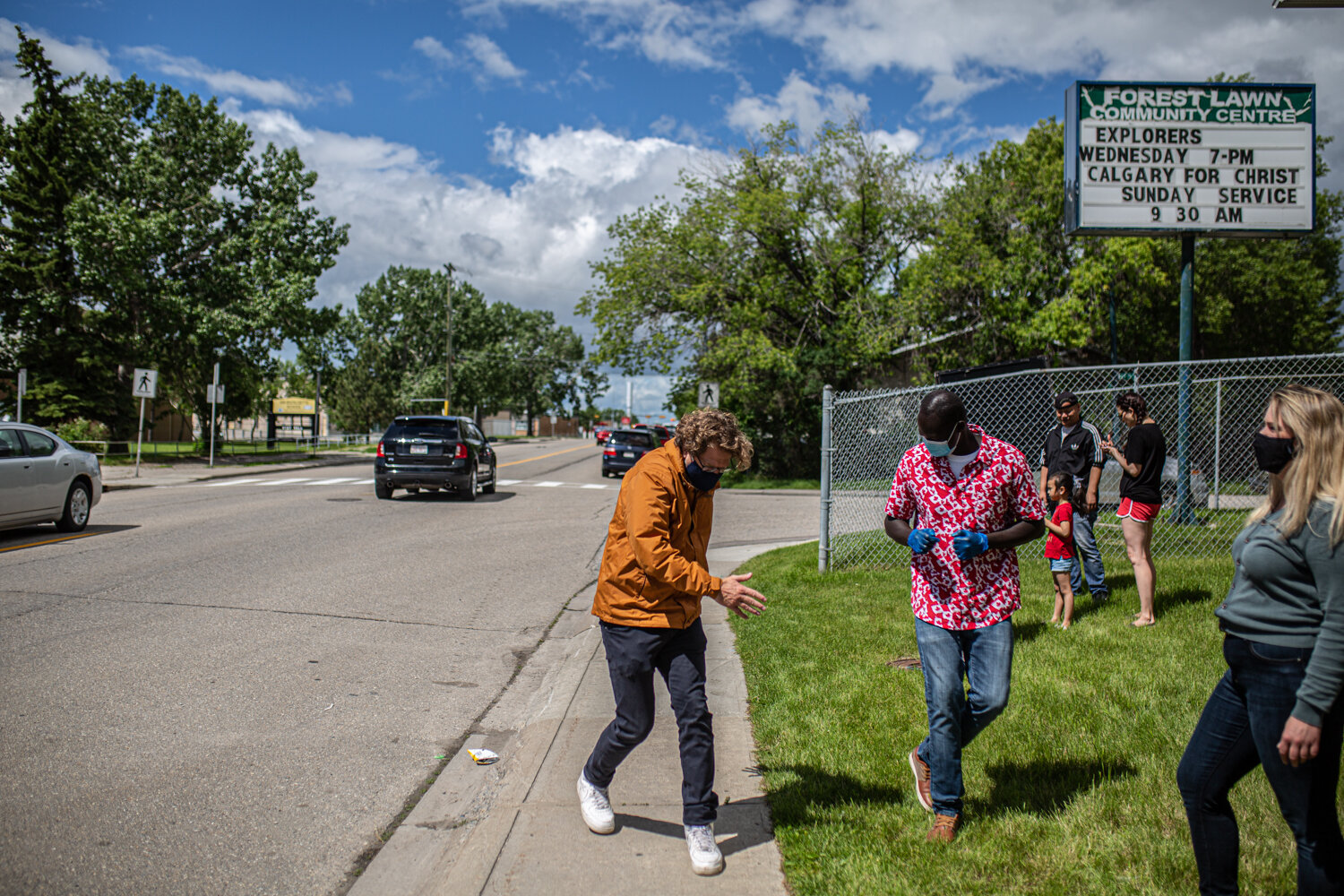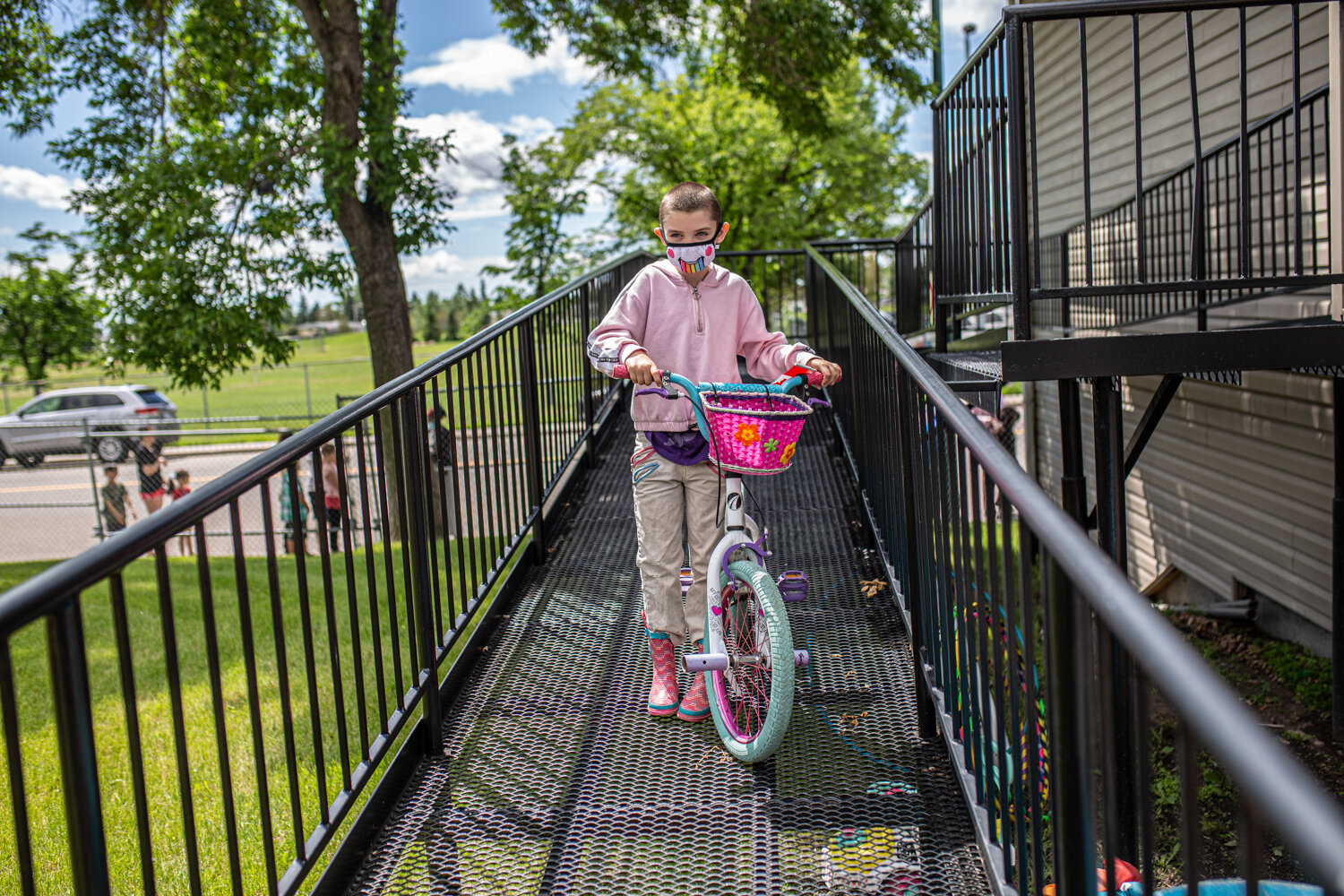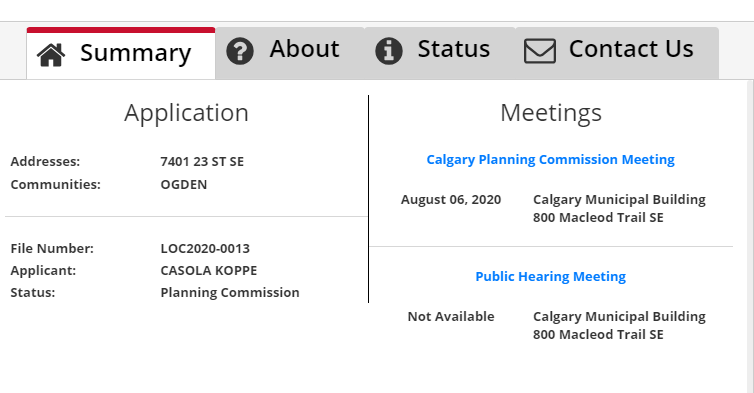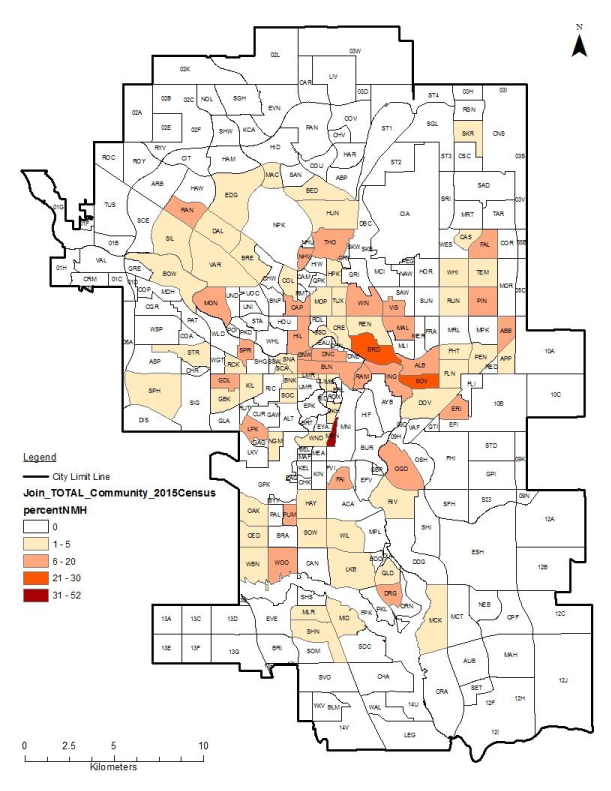Canada Day Forest Lawn Bike Giveaway!
This past Canada Day, YYC Kids Ride partnered with the Forest Lawn Community Association for the Forest Lawn Bike Giveaway!
FAQ: Ogden United Church Land Use Redesignation
WHO OWNS THE PROPERTY?
WHO IS RESPONSIBLE FOR THIS PROJECT?
The land is privately owned and operated by Ogden United Church. Ogden United Church is a congregation of The United Church of Canada. OUC was formed in 1914, and built its first church building on the church property in 1916. In response to changing community needs in Ogden, OUC expanded and redeveloped its property in 1958, and again in 1961.
A land use redesignation application is currently under review. Once the application is processed, you can view details on the City of Calgary’s Development Map.
This information is publicly available and provides members of the community with a summary, status updates, and information about redesignation requests.
The Ogden United Church is working in partnership with the Mustard Seed. This relationship grew out of a common commitment to social action and a desire to support a need in the Ogden Community. You can find more information about the project on their website HERE.
WHAT ARE THE INTENDED PLANS FOR THIS PROJECT?
The proposed usage of the site includes:
A Community Hub – a multi-purpose space, a neighbour centre with counselling services, employment coaching and advocacy, operated by the Mustard Seed.
Ogden United Church Sanctuary – a multi-purpose space for church services, spiritual engagement, and community meals for church goers, residents and community members.
Community Kitchen – operated by the Ogden United Church to provide meal planning lessons, cooking classes, and a space for locals to cook together and access resources.
Affordable Childcare – a pre-school and onsite daycare facility.
Community Café – a space to socialize and gather as a community, including employment opportunities.
Affordable, Permanent Apartments – 24 units
HOW DO MEMBERS OF THE COMMUNITY LEARN ABOUT DEVELOPMENT PROJECTS?
The details of any development application are not publicly available until they have been processed by the Planning Department. This can take anywhere from 1-3 weeks after the initial application is submitted. Once processed, all details are publicly available on the Development Map Website.
Once an application is submitted, the following parties are notified:
Community Association - Board of Directors
Calgary Planning Department
Calgary Planning Commission
City Councillor
The Community Association can review and provide feedback on development applications at any time. If needed, they are also welcome to expand consultations and engage residents during the process.
The property owner and/or developer must also consult with community members and provide an opportunity for feedback. Ogden United Church and the Mustard Seed have put together a web page for those interested in viewing details of their proposal.
Please note that the City Councillor or Administrative staff must maintain a neutral position until the application comes before Council and the public hearing is complete, therefore they cannot comment on or facilitate community engagement opportunities.
WHAT IS THE ROLE OF THE CITY AND THE CITY COUNCILLOR IN THIS PROCESS?
Every piece of land in Calgary has been categorized for specific use according to the City of Calgary’s Planning Bylaws. More commonly known as “zoning”, these categories offer guidance, safety regulations, and transparency for both the property owner and members of the community.
In order to build a new development or renovate a property in a way that significantly changes its use, all property owners must first put forward an application through the City of Calgary’s Planning Department.
The City of Calgary’s administrative staff first review the application to ensure that all mandatory requirements have been met and may provide feedback to the applicant. Following their review and recommendations, the application is then brought before the City Planning Commission. Details on when a specific application will be discussed at the Planning Commission are available on the Development Map Website.
During this time, and prior to the application coming before the City Council, it is the responsibility of the property owner to consult with members of the community and gain feedback on the project. Consultations can include many forms including online surveys, in-person meetings, site visits, mailers, etc. These consultations are a required part of the application process and serve to learn about and mitigate potential negative impacts to the community.
After these steps are complete, the application will come before City Council with a recommendation from the Planning Commission. Until this time, City Councillors must remain amenable to persuasion for all applications until the public hearing is closed.
During the public hearing, members of the public are encouraged to present their concerns. Members of the public are also welcome to contact their City Councillor prior to the public hearing but must understand that Councillors cannot comment in favor or against the application until it has come before Council and the public hearing is complete.
At the public hearing, ALL members of City Council vote on each application. Regardless of whether your City Councillor is in favor or against an application, they are only one of 15 votes that ultimately decide whether or not any given project is approved.
INFORMATION ABOUT AFFORDABLE HOUSING IN OGDEN:
The City of Calgary collects information on existing housing in Calgary every five years through the Non-Market Affordable Housing Survey
According to the most recent survey in 2015, 6% of dwelling units in Ogden were non-market and categorized as affordable housing
While this is higher than the percentage for the city overall (3.6%), there are 19 communities that have a higher percentage and 25 communities that have 6% or more of the total housing stock as non-market rental.
Affordable housing is present in 93 of the 204 residential communities in Calgary (see map below)
HOW CAN I MAKE MY VOICE HEARD?
As a concerned citizen, you have a number of options to see your concerns addressed.
Your Community Assocation can play an important role in advocating for your and can help collect feedback and share them productively with the City and with the applicant. Coordinating with your CA, as your local representative, is the best way to have your voice heard. Ward 9 staff, including Coun. Carra, regularly meets with CA representatives to hear concerns and assist with a variety of issues.
The Ward 9 office is happy to arrange and assist in bringing together the Ogden United Church and your Community Association to ensure your concerns are heard and addressed.
You are also welcome to share your concerns with the File Manager in the City of Calgary Planning Department. You can access their contact info by searching the site on the City of Calgary Development Map. The file manager works directly with the applicant and can make suggestions on your behalf.
You are also welcome to email your councillor’s office at ward09@calgary.ca . All inquiries will be shared with the councilor and deliberated upon to determine his final vote at council. Keep in mind that the councillor’s office is not responsible for the designs, nor the final-outcome has they are only 1/15 of the vote, therefore working directly with the Applicant, through your Community Association, will have more impact on the designs and final outcome.
Lastly, any member of the public is welcome to attend Council and take five minutes to share their concerns to the members of council and for the public record.
City of Calgary ready to reopen four aquatic and fitness facilities
Glenmore Trail / 68 Street S.E. intersection improvements
July 7 & 8. 2020: Public Hearing on Systemic Racism
As part of Calgary’s commitment to anti-racism, The City of Calgary is holding a Public Hearing on Systemic Racism through a meeting of the Standing Policy Committee on Community and Protective Services which is scheduled to start on July 7:
Notice of Motion Addressing Systemic Racism in Calgary (opens a separate page)
If you are interested in sharing your experience with members of Council at this meeting, please email us at publicsubmissions@calgary.ca before the start of the meeting (9:30AM, Tues, July 7) and include:
Your name
That you would like to speak at the “Anti-Racism Public Consultation.”
Once we receive your email, City Clerks will reply to tell you that we have received your request and that your name has been added to the list to speak at a specific time. If there are a large number of speakers, you may not be scheduled to speak until July 8.
Detailed instructions will be sent to you at least 24 hours before the start of the meeting on July 7 at 9:30 a.m.
People will be in groups of five (called panels). They will be provided with detailed call-in instructions advising them of their Panel # and when to call. Questions will be asked after all five speakers are finished with their presentation.
COVID-19 Protocols:
Due to COVID-19 speakers are asked to participate remotely. The Council Chambers will also be open to individuals who voluntarily wish to participate in person, subject to COVID 19 restrictions. Numbers of people in Council Chambers will be restricted due to COVID-19. Remote participation is preferred.
If you would like to provide your input in writing, instead of speaking at the meeting, please complete the following form (opens a separate page)
SCHEDULE
Blackfoot Ceremony with Prayers and Remarks from Elders Kelley and Daphne Good Eagle
Remarks from Mayor Nenshi
Report from Administration regarding ongoing efforts within the City of Calgary, and a Terms of Reference to approve the formation and funding of an Anti-Racism Action Committee and the Anti-Racism Capacity Building Fund
Remarks from Coun. Carra and Introduction of Dr. Malinda Smith as the Co-Chair for the meeting
DR. MALINDA SMITH, University of Calgary
Following an extensive search, I am pleased to announce that Dr. Malinda Smith has been appointed vice-provost (equity, diversity and inclusion), effective Aug. 1, 2020. Dr. Smith joins UCalgary from the University of Alberta where she is currently a professor in the Department of Political Science, conducting research and teaching in the areas of international and comparative politics, critical race studies, and gender and politics and serving as a provost fellow in equity, diversity, and inclusion (EDI) policy in the Office of the Provost at the University of Alberta.
As UCalgary’s inaugural vice-provost (EDI), Dr. Smith will be responsible for leading on issues of human rights, diversity, inclusion and equity with community members across campus and driving UCalgary’s institutional and community EDI goals.
Dr. Smith is a nationally recognized leader in EDI. She is widely regarded for her contributions to developing next-generation equity policies, including several task force reports and advisory roles in the post-secondary sector and at various levels of government. A 2018 Pierre Elliott Trudeau Foundation Fellow, her research, “A Seat at the Table: Engendering Black Canadian Pasts and Futures,” focuses on unearthing stories of Black hidden figures in Canadian politics, law and higher education. She is co-editor of the forthcoming volume, Nuances of Blackness in the Canadian Academy. Dr. Smith also serves on Statistics Canada’s Expert Working Group on Black Communities in Canada, and on immigration and ethnocultural statistics.
As the first person of colour to serve on the executive of the Federation for the Humanities and Social Sciences, Dr. Smith, as vice-president equity, spearheaded Equity Matters on the Ideas-Idees blog, and worked to embed EDI in Congress programming. She also has advanced equity as a member of the Canadian Association of University Teachers’ Racialized Academic Staff working group and as equity chair of her university’s faculty association. In addition, she contributed to EDI initiatives in national granting agencies, including the Dimensions EDI Charter and the Canada Research Chairs Program’s Advisory Committee on EDI Policy.
Dr. Smith is the co-author of The Equity Myth: Racialization and Indigeneity at Canadian Universities, editor or co-editor of five books and numerous articles and book chapters. She has received numerous awards and honours including most recently: the NBCC Rosalind Smith Professional Award (2020), the ISA’s Susan S. Northcutt Award (2020), a Pierre Elliott Trudeau Foundation Fellowship (2018), the ISA-Canada Distinguished Scholar Award (2018-2019), and a University of Alberta Equity, Diversity and Inclusion Award, (2018).
Born and raised in The Bahamas, Dr. Smith was awarded two master’s degrees from Western Michigan University (development administration, and political science), and a PhD in international relations and political philosophy from the University of Alberta.
Analysis on existing policies and best practices in equity, diversity, and inclusion from Dr. Malinda Smith
Introduction of the Expert Panel:
DR. FRANCIS BOAKYE, Centre for Newcomers
Dr. Francis Boakye is the Vice President, Strategy at the Centre for Newcomers. He has over 15 years of experience in the social services and has been engaged in teaching and research in the social work faculty, University of Calgary since 2008. Dr. Boakye was the research coordinator for a national project on Racism, Violence and Health (Calgary, Halifax and Toronto). He continues to represent the Centre for Newcomers on research projects with community and academic researchers on critical social issues. Dr. Boakye volunteers on several boards and committees whose mandates promote the building of stronger, better, and just communities. He is a member of the Social Wellbeing Committee of the City of Calgary, member of the Calgary Local Immigration Partnership (CLIP) Oversight Committee, and chairs the CLIP Social Inclusion Working Group.
VICKI BOUVIER, Mount Royal University
Victoria (Vicki) Bouvier is proud Michif-Métis born and raised in Calgary. Her ancestral connections are tied to the St. Francois Xavier community of the Red River and Boggy Creek, Manitoba. She is an Assistant Professor at Mount Royal University in Indigenous Studies and is currently a doctoral candidate in the Werklund School of Education at the University of Calgary. Her research focuses on Métis urban experiences and understandings, Indigenous oral systems, pedagogy, and assessment.
NYALL DABREO, Criminal Defense Lawyer, Community Advocate
Nyall DaBreo was born and raised in Calgary, Alberta where he attended St. Francis High School. He later attended the University of Calgary where he earned a Bachelor of Arts in 2009, with an emphasis in criminology. He later continued studies in Halifax, Nova Scotia where he attended Dalhousie University and obtained his Juris Doctor of Law in 2013. In his final semester at Dalhousie DaBreo completed a criminal law practicum during his final semester working daily under a Provincial Crown prosecutor. Following law school, DaBreo articled primarily in criminal law, and has continued privately practicing criminal law in Alberta since being called to the bar in 2014. He was inspired to pursue his career because of a passion for social injustice, social assistance, and a disdain for occasions where there is an abuse of state power. As a visible minority, DaBreo is a firm believer in Canadian values of diversity and inclusion, as well as the rule of law, he firmly opposes racism and hate in all its forms. His aim is to continue fighting for justice in the legal system and help change the climate of hostility toward minorities, with a specific emphasis on advocating for holding police accountable by applying transparent and justifiable oversight of their conduct, thus enhancing community trust, member accountability, and allowing for more fruitful evaluations of city resource allocation to best enhance this beautiful city.
TERESA WOO-PAW, Chair, Canadian Race Relations Foundation
Teresa is a tireless advocate for diversity, social inclusion and active civic participation. She is known for her ability in bringing diverse people together to joint efforts, break new grounds and create bigger impacts in society. She is the first Asian Canadian woman elected to the Calgary Board of Education (1995-2000), the Alberta Legislature and Cabinet Minister in Alberta (2008-2015). Teresa holds a bachelor of arts degree in social work from the University of Calgary. She founded and built 7 non-profit organizations over a span of 40 plus years including the ACCT Foundation, Asian Heritage Foundation, the Ethnocultural Council of Calgary (Action Dignity) and the Calgary Chinese Community Service Association. She has worked with almost 100 organizations in Calgary. Teresa received appointment as the Chair of the Canadian Race Relations Foundation by the Governor in Council in 2019 and is currently Chair of ACCT Foundation, Co-Chair of Asian Heritage Foundation, Board member of Calgary Arts Foundation, member of Alberta Anti-racism Advisory Council, Honorary member of the Korean Women’s Association and the Malaysian Singapore Brunei Cultural Association. Teresa loves the arts, gardening, travelling and spending time with her grandchildren.
PHIL FONTAINE, Former National Chief of the Assembly of First Nations
Mr. Phil Fontaine was born at the Sagkeeng First Nation (formerly known as Fort Alexander) in Manitoba, about 150 kilometers north of Winnipeg. His first language is Ojibway.
In his youth he attended a residential school operated by the Oblates of Mary Immaculate at Sagkeeng. He also attended the Assiniboia Residential School in Winnipeg and he graduated from Powerview Collegiate in 1961.In 1973, Mr. Fontaine was elected Chief of the Sagkeeng First Nation for two consecutive terms. Upon completion of his mandate, he and his family moved to the Yukon, where he was a Regional Director General with the Federal government.In 1981 Mr. Fontaine graduated from the University of Manitoba with a Bachelor of Arts degree in Political Science. After graduation, he worked for the Southeast Resource Development Council as a Special Advisor, which was followed by his election to the position of Manitoba’s Vice-Chief for the Assembly of First Nations. Mr. Fontaine was one of the Manitoba First Nation leaders instrumental in the defeat of the Meech Lake Accord.
In 1991, he was elected Grand Chief of the Assembly of Manitoba Chiefs and served for an unprecedented three consecutive terms. In 1997, he was elected National Chief of the Assembly of First Nations. After one term as National Chief, he was appointed Chief Commissioner of the Indian Claims Commission. Mr. Fontaine returned to the Assembly of the First Nations as National Chief, for two more terms, in 2003 and held the post until 2009. Among his many accomplishments as the longest serving National Chief, he will be most remembered for successfully negotiating the Indian Residential Schools Settlement Agreement, which included financial settlements for survivors and the establishment of the Truth and Reconciliation Commission.
Since September 1, 2009, Mr. Fontaine serves as a Special Advisor to the Royal Bank of Canada. His mandate is to "provide advice and counsel to RBC's Canadian businesses to help the company deepen its relationships with Aboriginal governments, communities and businesses in Canada".Mr. Fontaine is owner and President of Ishkonigan Inc., a successful consulting company he founded in 2009 specializing in Aboriginal relations, negotiations, government relations, mediation and advisory services.
He is a Member of Order of Manitoba and has received a National Aboriginal Achievement Award, the Equitas Human Rights Education Award, the Distinguished Leadership Award from the University of Ottawa, the Queen’s Diamond Jubilee, and most recently was appointed to the Order of Canada. Mr. Fontaine also holds eighteen Honorary Doctorates from Canada and the United States.
A discussion between Expert Panel and Committee Members
Opening the floor for public submissions (including remote and in-person presentations)
Each speaker is given 5 minutes to speak, in small clusters.
Following these presentations, Committee members have the opportunity to ask questions
Extra time is given for those needing assistance with interpretation
Please note that over 130 people were signed up to speak as of 3:30PM, Monday, July 6, 2020.
Tune in to the Public Hearing on Addressing Issues of Systemic Racism via the Council Livestream:
link: https://pub-calgary.escribemeetings.com/FileStream.ashx?DocumentId=134479
Enjoy Stampede Fireworks from Home!
Five art pieces by local artists coming to International Avenue this summer
June 15, 2020 | Notice of Motion: Calgary's Commitment to Addressing Anti-Racism
The following Notice of Motion will be introduced at the June 15, 2020 City Council Meeting by Coun. Carra at 7:15 PM. Watch: http://video.isilive.ca/calgary/live.html
These documents contain links to all references in efforts to remain fully transparent and accountable in our actions moving forward. The work is ongoing, but we clearly need to and must do more to ensure that our City is truly a place for Calgarians of all ages, wages, and stages.
WHEREAS recent protests as part of the Black Lives Matter movement have articulated the clear and compelling reasons to redouble our efforts to achieve structural adjustments to existing inequalities within our City and our society by listening to and learning from those who have been impacted by systemic racism;
AND WHEREAS the City of Calgary has worked to identify and address structural inequalities experienced by our citizens through a variety of policies and initiatives, including but not limited to: the Social Wellbeing Policy, Welcoming Communities Policy, Gender Equity, Diversity and Inclusion Strategy, Multicultural Communications & Engagement Strategy, Resilient Calgary Strategy and the White Goose Flying Report;
AND WHEREAS in 2006, The City of Calgary became a member of the Canadian Coalition of Municipalities Against Racism and Discrimination (CCMARD, now known as Canadian Coalition of Inclusive Municipalities (CIM)), committing to undertake initiatives to eliminate all forms of discrimination with a view to building open and inclusive societies;
AND WHEREAS in Fall 2019, Calgary City Council unanimously opposed Quebec’s Bill 21 (An Act Respecting the Laicity of the State) and agreed to continue to support building a welcoming city where everyone has access to opportunity and prosperity;
AND WHEREAS on February 3 2020, City Council established a Community-Based Public Safety Task Force “that will report back to Council with its best advice and recommendations relating to identifying and addressing community concerns around violence, including gangs and gun violence, based on the Task Force's engagement with community groups, review of existing programs and services locally and in other relevant jurisdictions”, understanding that the Task Force will be engaging with marginalized communities, including Black and Indigenous communities, as part of this work.
AND WHEREAS the Alberta Urban Municipalities Association’s (AUMA) Welcoming & Inclusive Communities Toolkit, in partnership with the Government of Alberta, “supports municipalities to implement policies and practices to help overcome issues or racism and discrimination”;
AND WHEREAS despite the prevalence of these aforementioned policies and programs, structural inequalities persist and further marginalize many Calgarians, particularly those who are Black, Indigenous and People of Colour, who find themselves unable to live lives of full potential and dignity;
AND WHEREAS the Alberta civil liberties research centre has defined "anti-racism" as being "the active process of identifying and eliminating racism by changing systems, organizational structures, policies and practices and attitudes, so that power is redistributed and shared equitably."
AND WHEREAS in Action Dignity’s latest report, COVID-19 Related Racism and Xenophobia (released 2020 April 29), 84% of respondents indicated they had either seen, heard or experienced incidents of racism or xenophobia related to COVID-19;
ND WHEREAS citizens around the world are demanding more accountability from public safety and policing organizations regarding the implementation of anti-racism practices and policies, and Calgarians would benefit from a more transparent discussion around the many efforts of the Calgary Police Service in working toward a citizen-overseen, community-policing, community-based participatory police service models
AND WHEREAS Calgary City Council and the Administrative Leadership Team are currently not reflective of our community in terms of gender and racial diversity, which means we need to be much more intentional about actively working to advance the ideals and actions set out in the policies and strategies referenced above, and must be held accountable by everyone we serve;
AND WHEREAS Municipal governments in Canada have responsibilities under Canada’s Charter of Rights and Freedoms as well as the Alberta Human Rights Act and play an important role in combating racism and discrimination while fostering equality, equity in opportunity, and respect for all citizens.
THEREFORE BE IT RESOLVED that the City of Calgary respond to citizen requests to hold a public consultation on systemic racism through a meeting of the Standing Policy Committee on Community and Protective Services which would include presentations from an expert panel and opportunities for public submissions;
BE IT FURTHER RESOLVED that the city of calgary establish an anti-racism action committee, to be appointed at its organizational meeting in october 2020, to develop and implement a community-based anti-racism strategy that will:
(a) identify systemic barriers to accessing city of calgary programs and services;
(b) identify language barriers in accessing information regarding the city of calgary program and services
(c) identify opportunities to work with community partners and organizations on actions to address structural racism on a community-wide level; and
(d) be diverse and inclusive, and a true reflection of calgary's residents
BE IT FURTHER RESOLVED that as a part of the work above, and informed by the aforementioned public consultation through the community and protective services committee, council direct Administration to immediately engage in meaningful re-evaluation of City of Calgary internal practices and policies through the Diversity and Inclusion Framework lens. This includes but is not limited to budget deliberations, organizational structure, human resource practices, and procurement.
BE IT FURTHER RESOLVED that the Calgary City Council (including Council Staff) and the Administrative Leadership Team demonstrate a commitment to meaningful change by undertaking mandatory training on anti-racism best practices as soon as possible, and commit to recurring training no less than once every four years.
BE IT FURTHER RESOLVED that the Calgary City Council formally request the Calgary Police Commission to report to Council as soon as possible on the anti-racism work currently underway and contemplated within the Calgary Police Service, and any plans for engaging in a broader conversation with the community on the future of policing in a diverse city.
AND BE IT FURTHER RESOLVED that Council request the Community-based Public Safety Taskforce to consider issues of systemic racism in its work.
2020 Property Tax Assessments and Financial Supports
Tax bills for approximately 530,000 residential and non-residential properties were mailed out to residents in the last week of May. All property owners should have received their property tax bill in the mail by now. Uou can access a breakdown here.
Property owners who have not received their property tax bill by the first week of June should visit calgary.ca/propertytax or contact 311 to obtain a copy of their bill.
Property tax is due Tuesday, June 30th. If you are facing financial hardship because of COVID-19, you have the option to delay your payment until Sept. 30 without a late payment penalty.
If you are able to pay the property tax on or before June 30, you can also participate in the Tax Instalment Payment Plan (TIPP), we recommend considering this option as property taxes will be supporting essential services for all Calgarians.
The property tax deadline does not apply to property owners who pay monthly through TIPP. The regular filing fee for taxpayers who join TIPP has been suspended until January 1, 2021. This makes it easier for property owners to join TIPP, which helps them avoid late payment penalties and a large lump payment. More than 270,000 property owners pay their tax monthly through TIPP. Property owners can join TIPP at any time by visiting the TIPP website to request an agreement or by calling 311.
The Tax Installment Payment Plan (TIPP) has suspended its 2% filing fee for taxpayers who join TIPP after January 1, which has been suspended until January 1, 2021.
The Property Tax Assistance program (PTAP) is available to assist eligible low-income homeowners who meet income guidelines and eligibility criteria, regardless of age.
Funds collected through property tax are split between the Alberta Government and The City of Calgary. Property owners can visit the Property Tax Breakdown to enter the amount of their property tax and see how their municipal property tax dollars are invested in City services that Calgarians rely on every day. You will also be able to utilize the Property Tax Calculator tool for further information and estimates.
The City is committed to engaging with Calgarians and working together to ensure our services align with their priorities in a fiscally responsible manner. We want citizens to know how property tax is collected and used to deliver essential City services and programs while keeping the cost of local government low.
Council Approved New Relief Measures to Support Citizens and Businesses
The new relief measures introduced on April 6 are in addition to measures previously approved by Council:
Nov. 19, 2019 - Use of one-time funding to maintain last year’s municipal tax rate for both residential and non-residential property owners.
Nov. 19, 2019 - Shifting the tax responsibility from 49 per cent residential and 51 per cent non-residential, to 52 per cent residential and 48 per cent non-residential in order to provide support to businesses and non-residential property owners.
In November 2019, Council approved 2020 budget adjustments in a thoughtful process that allowed the Calgary Police Service and Civic Partners to preserve their budgets, while taking a least harm approach in reducing some City services. Additionally, Council directed Administration to provide options for a transitional non-residential phased tax program for 2020 and 2021, as well as strategies and initiatives to achieve targeted budget reductions of $24 million in 2021 and $50 million in support of Calgary’s economic recovery.
Feb. 3. 2020 - City Council approved $30 million in tax relief for Calgary businesses who have experienced the most significant municipal property tax increases over the past four years. Learn more about the 2020 Municipal Non-Res Phased Tax Program.
Mar. 16, 2020 – Utility payment relief measures established including increased payment flexibility installment plans, extending payment dates and/or suspension of collection-related activities on their ENMAX and City of Calgary municipal services. Additionally, disconnection of electricity service for non-payment has been suspended until further notice
Mar. 29,2020 – Business Improvement Areas late payments deferred from April 1 until June 30. For more information please visit: www.calgary.ca/covid-business
In addition to municipal taxes, municipalities collect taxes on behalf of the province. The combination of the municipal and provincial increases results in a combined increase to residential taxpayers of:
7.55 per cent or $240 per year ($20 per month) for the median assessed property of $455,000 after the Council rebate.
Excluding the impact of assessment changes and Phased Tax Program (PTP) rebates, non-residential taxpayers will see a combined decrease of:
12.07 per cent or $2,640 per $1 million of assessed value annually ($220 per month) after the Council rebate
Tax Instalment Payment Plan (TIPP)
The Tax Instalment Payment Plan (TIPP) is a popular program that allows you to pay your property tax on a monthly basis instead of one payment in June.
Property Tax Assistance Program (PTAP)
If you are a residential property owner experiencing financial hardship, regardless of age, you may be eligible for a credit/grant of the increase on your property tax account.
Alberta Seniors Property Tax Deferral Program
The Alberta government also offers a Seniors Property Tax Deferral Program. This program allows eligible senior homeowners to voluntarily defer all or part of their residential property tax, including the education tax portion. This is done through a low-interest home equity loan with the Government of Alberta.
Utility Bill Support Programs
In response to the COVID-19 situation, we have implemented a COVID-19 customer relief program for residential and small commercial ENMAX customers. This includes increased payment flexibility such as installment plans, extended payment dates and suspension of collection-related activities on your account. We will not disconnect services, and late payment fees will not apply until further notice.
In addition, the Government of Alberta and City of Calgary announced 90-day payment deferral programs.
You have the option of either deferring your bills entirely through the Government of Alberta and City of Calgary programs, or setting up a customized payment plan to best manage your bills at this time.
Please call us at 310-2010 to discuss the options available through our COVID-19 customer relief program or to set up a 90-day payment deferral.
If you are a commercial customer and have questions about your account, please contact your dedicated Account Manager or Client Care at 1-866-331-2199 or business@enmax.com.
Prepare for Flooding in Calgary
Neighbour Day 2020 - City of Calgary
Flyover Park: Construction Begins!
YYC Grocery Delivery: Free custom grocery delivery for Calgarians in need
Prohibited businesses bylaw passed by Council to ban the practice and promotion of conversion therapy in Calgary
Project Update: 8th Ave SE Corridor Improvements
Project Update: 11 Street/12 Street S.E. route improvements (9 Ave to 26 Ave S.E.)
NEW: 2020 Inglewood / Ramsay Construction Map
Urban Forestry Canopy Expansion Program
Urban Forestry is collaborating with City business units to find a cost-effective way to achieve tree canopy growth over time by investing in tree seedling plantings. Through a partnership with the City of Calgary Roads Department and Parks Urban Conservation, potential planting sites have been identified throughout the City. These roadside sites are currently low maintenance, semi naturalized, and have no plans for expansion or interchange development for at least the next decade. Sites may be planted with a single planting event or have multiple planting events over several seasons.
Read MoreErin Woods Traffic Calming Project
City staff worked with the Erin Woods Community Association residents to develop a traffic calming plan to address concerns regarding the safety of people walking and cycling throughout the community and to reduce the speeds of drivers. This included placing temporary traffic calming devices in the roadway and two phases of community engagement.
Read More